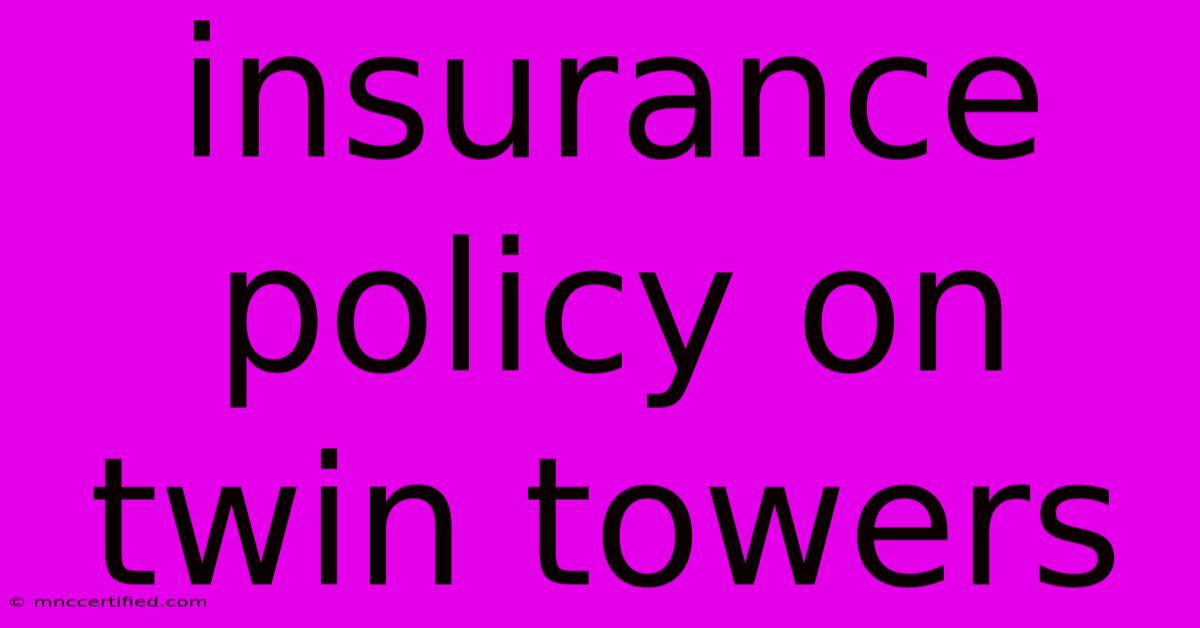Insurance Policy On Twin Towers

Table of Contents
The Insurance Aftermath of 9/11: Understanding the Twin Towers Policy
The collapse of the Twin Towers on September 11, 2001, remains a defining moment in history, leaving an indelible mark on the world. Beyond the human tragedy, the event presented an unprecedented challenge to the insurance industry, forcing a reassessment of risk assessment and coverage for catastrophic events. This article delves into the complexities of insurance policies related to the Twin Towers and the subsequent payouts.
The Scale of the Disaster and Insurance Coverage
The destruction of the World Trade Center complex involved not only the Twin Towers but also surrounding buildings, infrastructure, and businesses. The sheer scale of the destruction meant that the insurance claims were astronomical, exceeding the capacity of individual insurers. Multiple layers of insurance coverage were in place, including:
- Property insurance: This covered the physical damage to the buildings themselves, including the cost of demolition and rebuilding. The value of the property insurance policies on the Twin Towers was substantial, though the exact figures remain somewhat shrouded in secrecy due to the complex nature of the agreements.
- Business interruption insurance: This compensated businesses for lost revenue and expenses incurred due to the disruption caused by the attacks. Many businesses in the surrounding area suffered significant losses, leading to substantial claims under this type of policy.
- Liability insurance: This addressed potential claims against the building owners and other parties for injuries or deaths caused by the collapse. Given the immense loss of life, liability claims played a significant role in the overall insurance payouts.
The Role of Reinsurance
The scale of the losses necessitated the involvement of reinsurance companies. Reinsurance acts as a safety net for primary insurance companies, allowing them to spread their risk across a wider pool. In the case of 9/11, reinsurers played a crucial role in absorbing a significant portion of the losses, preventing widespread insolvency within the insurance industry. This complex web of insurance and reinsurance contracts made the settlement process incredibly intricate and protracted.
Legal Battles and Settlements
The aftermath of 9/11 saw numerous legal battles regarding insurance payouts. Disputes arose over policy interpretations, the definition of "terrorism," and the allocation of responsibility among different insurers and reinsurers. The sheer volume of claims, coupled with the novel nature of the event, made it challenging to arrive at swift and equitable settlements. Negotiations and legal proceedings extended for years, with insurers and the affected parties grappling with complex legal precedents and the determination of appropriate compensation. Many cases involved intricate debates regarding exclusions within policy wording, particularly around acts of terrorism.
Lessons Learned and Industry Changes
The 9/11 attacks highlighted significant gaps in the existing insurance framework, specifically concerning the coverage of large-scale terrorist attacks. The event prompted significant changes within the insurance industry, leading to:
- Increased emphasis on terrorism risk assessment: Insurers began to incorporate terrorism risk more thoroughly into their underwriting processes.
- Development of specialized terrorism insurance programs: Government-backed schemes were developed to mitigate the risks associated with large-scale terrorist attacks.
- Refined policy wording: Policies were revised to clarify coverage related to acts of terrorism, minimizing ambiguity and future disputes.
Conclusion: A Lasting Impact
The insurance policies on the Twin Towers and the subsequent claims process offer a compelling case study in the challenges faced by the insurance industry when dealing with catastrophic events. The unprecedented scale of the 9/11 attacks forced a reevaluation of risk assessment, coverage limits, and the role of reinsurance. The event's enduring impact on the insurance landscape underscores the critical importance of comprehensive risk management and the need for robust mechanisms to handle future large-scale catastrophes. The legacy of 9/11 continues to shape the insurance industry's approach to risk, ensuring a more prepared and resilient system for future challenges.

Thank you for visiting our website wich cover about Insurance Policy On Twin Towers. We hope the information provided has been useful to you. Feel free to contact us if you have any questions or need further assistance. See you next time and dont miss to bookmark.
Featured Posts
-
Life Insurance For A Single Person
Nov 23, 2024
-
Node Ai Crypto Price Prediction
Nov 23, 2024
-
Invest With Power Crossword Clue
Nov 23, 2024
-
Lamars Surprise Album Released
Nov 23, 2024
-
Floating Neutral Vs Bonded Neutral
Nov 23, 2024